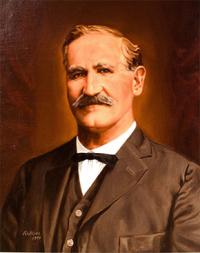
John Judson Brown was born near Vanna, in Hart County, on December 17, 1865 to Ira and Susan Brown. The Browns were descendants of the northeast Georgia pioneers who had entered the territory and carved farms and small villages out of the wilderness. In 1885, Brown married Captora Terressie Ginn, and the two built a small log cabin across from Little Holly Springs where they farmed four to five hundred acres of land. Brown would expand his farm operation, buying and renting land and running eight or ten plows. By the early 1900s, he and Goron Ginn, cousin by marriage, had organized J.J. Brown and Company. In addition to running a general merchandise store, they established the first modern Munger cotton gin and the first roller mill to process wheat into flour in that part of the state.
J.J. Brown was a hardscrabble dirt farmer and staunch Georgia Populist. Much of his political success was owed to his personal and professional friendship with Thomas E. Watson. In the 1914 Democratic Primary, Watson developed a political strategy that would pit Brown against incumbent Commissioner James D. Price. Brown would later lose that election, but in 1916, would take his message of reform "from Rabun's Gap to Tybee Light." Brown would win 86 counties to Price's 62 and on February 14, 1917, became the eighth commissioner of agriculture with a salary of $5,000.
During Brown's five consecutive terms as commissioner, from 1917 to 1927, he pushed for crop diversification, argued for legislation to facilitate landownership for tenant farmers, urged a more progressive land tax, established the Georgia Bureau of Markets, presided over the largest food crop production at that time in Georgia history, and established the Market Bulletin. In the election of 1926 Brown was handily defeated by Eugene Talmadge. After his time in the political spotlight, Brown purchased a large farm in south Georgia and returned to farming.
In the mid-1940s, urged by his youngest son, Walter J. Brown (who had married Watson's granddaughter), Brown moved to Thomson, where he lived his last years in Watson's first home. He died on December 6, 1953. His funeral, hailed as "one of the last of the old-time political funerals," was attended by numerous Georgia statesmen as well as Strom Thurmond, a U.S. Senator from South Carolina, and South Carolina Governor James F. Byrnes.


